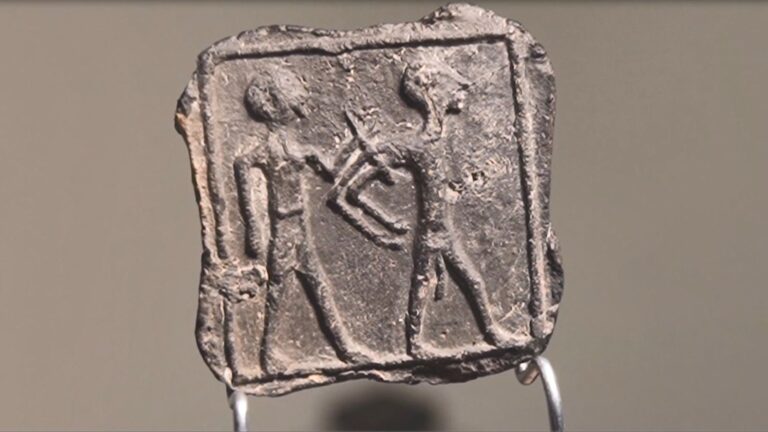
6-year-old discovers rare 3,500-year-old tablet
The clay tablet from the Canaanite period depicts a man leading a humiliated captive. The boy who found it won a certificate of good citizenship.
by Abigail Klein LeichmanThe story probably didn’t end happily for the bound and naked captive depicted on a 3,500-year-old clay tablet recently found in Israel.
Things have turned out much better for the six-year-old boy who stumbled across this rare find a couple of months ago.
Imri Elya from Kibbutz Nirim near the Gaza Strip spotted the 2.8-square-centimeter (1.1-square-inch) tablet while walking with his parents at the Tel Jemmeh archaeological site near Kibbutz Re’im.
The curious boy picked up the object and saw two figures engraved on it. His parents contacted the Israel Antiquities Authority and the item was transferred to the IAA’s National Treasures Department.
After photographing and documenting the artifact in the IAA’s digital photography laboratories, archaeologists realized that nothing similar has ever been discovered in archeological excavations in Israel.

The tablet depicts the scene of an important man leading a naked captive with hands folded and tied behind his back. The captor has curly hair and a full face, while the captive is thin and his face elongated.
IAA archaeologists Saar Ganor, Itamar Weissbein and Oren Shmueli Archeologists believe the tablet was made in the Late Bronze Age, between the 12th and 15th centuries BCE. During this period, the Egyptian Empire ruled Canaan.
Tel Jemmeh is identified with the Canaanite city of Yurza, one of the strongest Canaanite cities in the south of the country. The scene depicted on the tablet may symbolically describe the power struggles between Yurza and a nearby city such as Gaza or Ashkelon.
“This opens a visual window to understanding the struggle for dominance in the south of the country during the Canaanite period,” the archeologists said.
Imri may not grasp the historical significance of his discovery, but he’s gotten plenty of attention and a certificate of good citizenship from the IAA. He joins many other Israeli kids who have stumbled across archeological treasures.
More News

Celebrate all things Israeli wine, even from afar
By Naama Barak
Hospital ‘ICU of the future’ prepares Israel for second corona wave
By Abigail Klein Leichman
Self-disinfecting tech could make N95 facemasks reusable
By Brian Blum
As corona crisis eases, Israel opens for business again
By Naama Barak
ASOS, Adidas switch to Israeli tech to model clothes online
By Abigail Klein Leichman
In first, Asiatic lions welcome two cubs at Jerusalem zoo
By Naama Barak
Jerusalem tech startup scene has grown 102% since 2012
By Abigail Klein Leichman
Two Israeli firms receive ‘Oscars of the Internet’ honors
By Abigail Klein Leichman
Study: 70% of Israel’s Covid-19 cases came from America
By Brian Blum
Israeli scientists develop corona-busting disinfectant that stays active
By ISRAEL21c Staff
9 Israeli digital health startups to watch
By Abigail Klein Leichman
Dead Sea Scrolls secrets revealed live online this week
By ISRAEL21c Staff
Cool moving images for your Zoom meeting background
By Abigail Klein Leichman
Israeli scientists develop 3D sperm-cell imaging tech
By Naama Barak
Aidoc to help radiologists detect Covid-19 on CT scans
By Abigail Klein Leichman
European Investment Bank banks on Israeli cell therapy
By Naama Barak
Global survey confirms loss of smell, taste as Covid-19 signs
By ISRAEL21c Staff
New drug formula to be tested against resistant bacteria
By Brian Blum
Israeli antimicrobial washable facemasks enter US market
By Abigail Klein Leichman
New antimicrobial coating disinfects surfaces from virus
By Abigail Klein Leichman